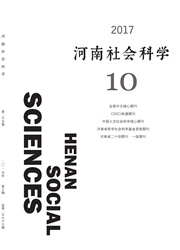

 中文摘要:
中文摘要:
先秦逻辑研究有"中国逻辑史研究中的‘现代主义’"与"了解之同情"两种范式,作为前种范式之研究成果大致可以归为符号学、语言学、逻辑学、哲学等领域;后种范式基于文本与文本时代特征衍生出文本义理,归为历史学(如中国逻辑史等)领域。"‘白马非马’论证"研究也不例外,有"白马非马"论证兼名说、复合名词说、形式化理论说、诡辩说、任意对象理论说等,也有"唯谓"说、"物–物指"说等。本文提出了"唯位"说,即"白马非马"命题提出的理论根据是"位其所位",这里涉及"物、实、指、名、位、谓"诸范畴;并进而论证《公孙龙子》逻辑理论篇为《名实论》与《指物论》,其中《指物论》补充《名实论》里的"物"与"指"关系,例证篇为《白马论》、《通变论》、《坚白论》,其中《通变论》与《坚白论》完善《白马论》中的"白马非马"例证,得出"白马非马"论证是先秦思想孕育出的一种逻辑。
 英文摘要:
英文摘要:
There are two paradigms in the studies of Chinese Logic in Pre-Qin period: Mod-ernization and Understanding through Sympathy. For most researches endorsing the Modernization paradigm, they could be classified into studies of semiotics, linguistics, logic, and philosophy. However, for researches endorsing the Understanding through Sympathy paradigm, they would be classified into historical studies, due to the fact that they are attempts to interpret classic texts within their social historical contexts. The studies of the White Horse Argument have also been dominated by these two research paradigms, resulting in different ways in understanding this argument: the Jian-Ming interpretation, the compound-nouns interpretation, the formal-theory interpretation, the unspecific-reference interpretation, the sophism interpretation, the predicate interpreta-tion and the Wu-Wuzhi interpretation. This paper argues for a new interpretation of the White Horse Argument based on the category of Wei. It contends that the understand-ing of“Bai Ma Fei Ma”should be grounded on a theory of“Wei Qi Suo Wei”, which includes an understanding of several categories such as Wu, Shi, Zhi, Ming, Wei. Based on this new interpretation, this paper further argues that the logical theory in Gongsun-longzi is indeed articulated in the chapters of Mingshilun and Zhiwulun. In general, the theory of the relationship between Wu and Zhi proposed in Mingshilun has been con-tinued and consolidated in Zhiwulun, and then has been exemplified in the chapters of Baimalun, Tongbianlun, Jianbailun. Particularly, the White Horse Argument advanced in Baimalun has been further illustrated and strengthened in Tongbianlun and Jianbailun. It is concluded that the White Horse Argument should be treated as a specific form of Chinese logic developed in Pre-Qin period, it is different from any other types of argu-ment emerged in the Western thought system.
 同期刊论文项目
同期刊论文项目
 同项目期刊论文
同项目期刊论文
 期刊信息
期刊信息
